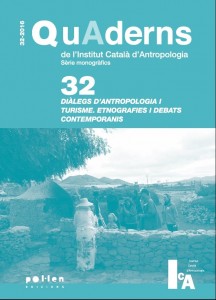Monográfico Quaderns Institut Català d’Antropologia
Coordinado por las investigadoras Saida Palou Rubio y Fabiola Mancinelli acaba de salir el monográfico Diàlegs d’antropologia i turisme. Etnografies i debats contemporanis en la revista Quaderns Institut Català d’Antropologia. Quaderns es una de las revistas científicas de mayor tradición, implantación (se publica ininterrumpidamente desde 1980) y reconocimiento de las que se publican en España en el ámbito de la antropología social. En la actulidad está indexada en la base de datos Scopus y en el prestigioso European Reference Index for the Humanities (ERIH).
En este monográfico han salido publicados dos artículos de investigadores de Culturdes. Se trata de los artículos «Entre el lentisco y la jara. Cinco conclusiones socio-antropológicas sobre el turismo» cuyo autor es el profesor Antonio Miguel Nogués-Pedregal, en el que resume los avances teóricos que, gracias a las investigaciones socio-antropológicas, se han realizado en la comprensión del turismo como fenómeno socio-cultural. Y, por otra parte, el artículo «Discursos periodísticos y prácticas comunicativas alrededor del turismo. El caso de Portmán (Región de Murcia)», cuyos autores son los investigdores Raúl Travé Molero, Daniel Carmona Zubiri y Antonio Miguel Nogués, en el que, a partir de un trabajo de campo etnográfico, se propone entender el turismo como mediador significativo de la vida cotidiana de una población sometida a un fuerte proceso de reconversión económica y territorial.
El resto del monográfico participan especialistas de reconocido prestigio en el panorama de la socio-antropología que se acerca a estudiar el turismo.

